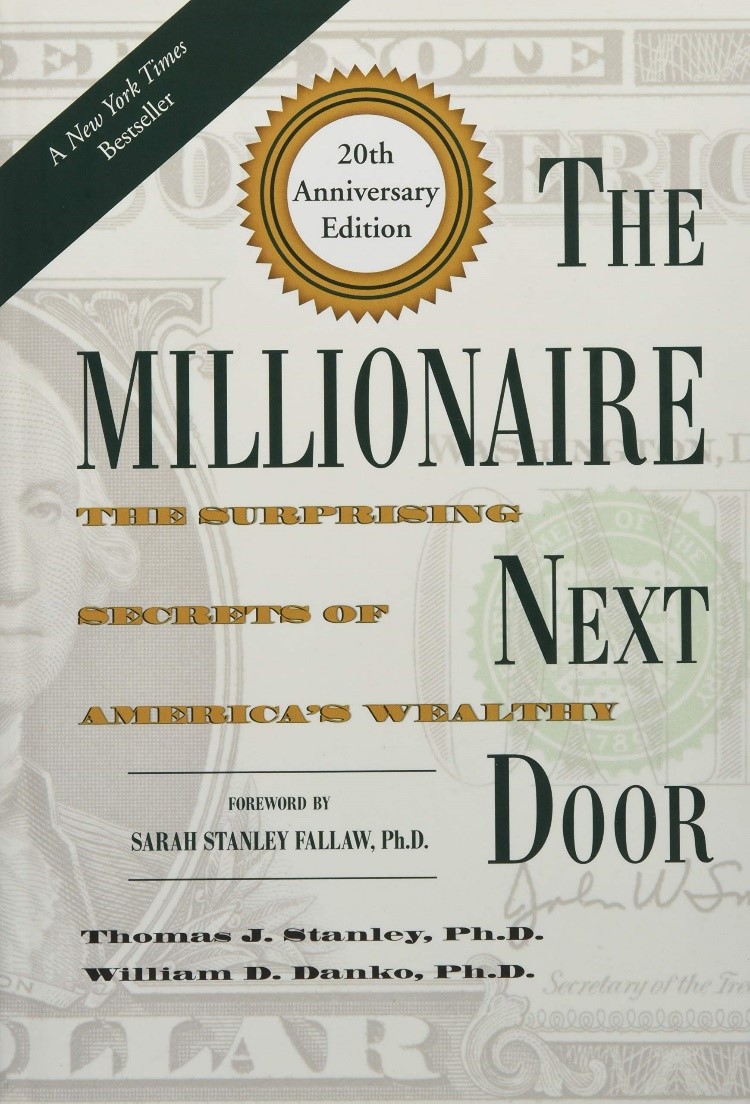and what he looks for now when selecting listed companies on the markets.
There’s a fog in the minds of many investors.
Whether it’s building a direct portfolio or watching your KiwiSaver go up and down — people tend to forget something.
When you buy shares, you’re buying little pieces of businesses. Businesses carry risk.
They can also be transformational.

Source: Amazon
The Millionaire Next Door is one of the most comprehensive studies of America’s wealthy. Thomas Stanley made some fascinating discoveries:
- The vast majority of US millionaires are business owners.
- Most of these businesses aren’t that exciting: scrap-metal dealers, grocery wholesalers, farm operators, and truck-stop owners.
- Most of the millionaires did not get any money from their parents to start their business or to attend university. They worked and backed themselves.
- On average, they put around 20% of their income into investing each year.
- They spend time on financial planning and use professionals to help them.
When these millionaires go to invest, it makes sense that they’re also investing into businesses on the stock market. They’ve seen the potential in their own lives for businesses to grow, produce income, and create wealth.
They also understand that business is risk.
What makes a good business to invest in?
When we look at listed companies, there are a few things we like to see:
High net profit margin
This suggests that this company’s products and services carry a premium. Possibly, there’s some moat protecting them from too much competition.
Return on investment
We’re interested in how efficiently a business can get a return on each dollar invested. Airbnb Inc [NASDAQ:ABNB], for example, is a company showing an ROI of around 30%. It’s quite a smart business model because it uses technology and other people’s capital (their homes and apartments) to generate revenue.
Value metrics: earnings and book value
We also look keenly at the price you have to pay with the stock to buy the earnings, and the assets the business owns. This means working out the future growth potential, which is very tricky. If a business seems expensive by price to earnings but could grow 50% — then from a future perspective, that price could be cheap.
These days, some of the easiest value to target has been listed real estate. The interest-rate story has discounted some quality property assets more than seems reasonable. In these cases, we look at the price to tangible book value per share. And try to assess the potential future value.
Get grounded in enterprise
Most of my working life has been as an owner or part-owner in small businesses, and in investing in larger businesses via the sharemarket.
I was very lucky to get involved in small business at a young age.
When I was 16, I was looking for an opportunity to make some money. And I didn’t really like running in the annual school cross-country.

School cross-countries are popular the world over. It was my first business opportunity.
Source: Wikimedia Commons
I spotted that the local wholesaler was doing a special on Moro bars and cans of Coke.
I’d won a prize for raising money for the school from running a car wash. So I had an in with the headmaster. He also liked to encourage enterprise.
We ended up doing a deal where I would run the first part of the cross-country, then set up my drum of ice. I would share half my profits with the school.
My first business worked well because the profit margin on my bulk buy from the wholesaler was 100%. I later teamed up with some friends to sell chilled pizzas door to door. Following the same lesson of working on a great margin.
As you get older, it gets harder. You become more conscious of risk and failure.
Looking back at my own business experience, I would probably have done better had I used debt to take on larger opportunities.
But that’s the risk-reward equation, isn’t it?
You learn from making mistakes in business and in investing. And if those mistakes are amplified by debt, the lessons can be all the more costly.
If you’ve been in business, you’ll understand where I’m coming from. Business opportunities can exist at a certain period in time. Then things can change or dry up.
By the time a company gets listed on a major exchange, they’ve mainly proven their business model. It now comes down to studying whether they can grow further or at least sustain their profits and dividends.
Are you an Eligible or Wholesale Investor looking to build up your own portfolio of shares in areas like real estate, materials, energy, and technology?
If so, we have a unique solution at Wealth Morning. We run a trading desk four nights a week, accessing the global markets. And for our clients, we seek to build robust portfolios that can deliver income and growth.
It’s called Wealth Morning Managed Accounts.
Right now, we are offering free consultations on this service to learn more and check if you may be eligible.
These are available until Tuesday 24th October.
🎯 Please register your interest here.
Regards,
Simon Angelo
Editor, Wealth Morning
This article is the author’s personal opinion and commentary. It is general in nature and should not be construed as any financial or investment advice. Wealth Morning Managed Accounts are only available to Eligible Investors and Wholesale Investors (not to Retail Investors) as defined in the Financial Markets Conduct Act (2013).





Simon is the Chief Executive Officer and Publisher at Wealth Morning. He has been investing in the markets since he was 17. He recently spent a couple of years working in the hedge-fund industry in Europe. Before this, he owned an award-winning professional-services business and online-learning company in Auckland for 20 years. He has completed the Certificate in Discretionary Investment Management from the Personal Finance Society (UK), has written a bestselling book, and manages global share portfolios.